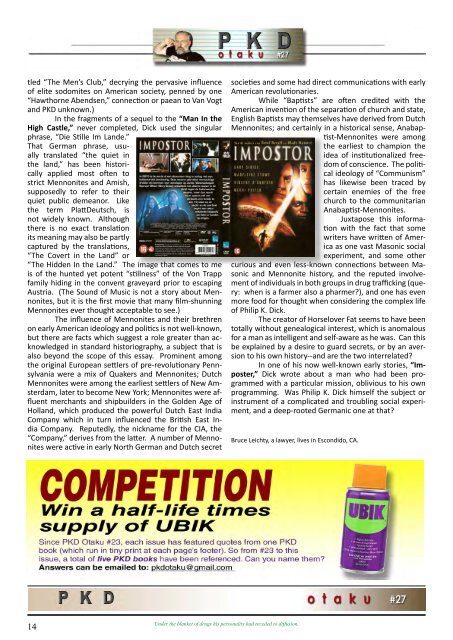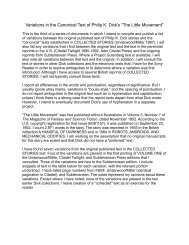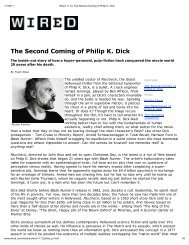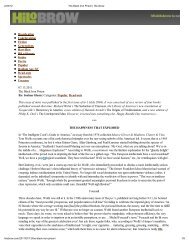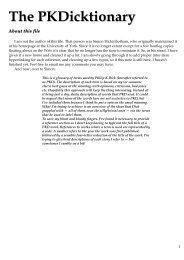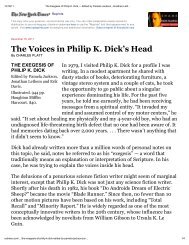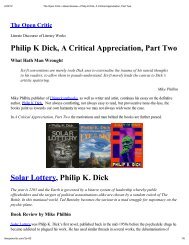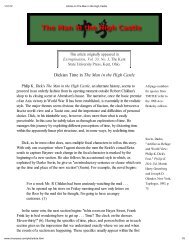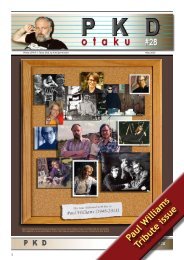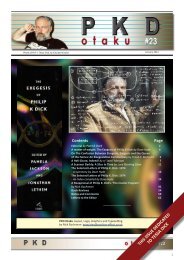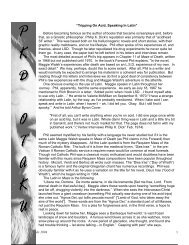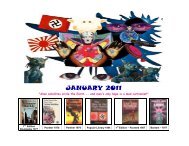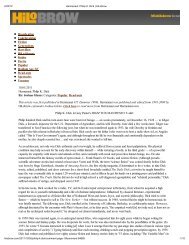PKD Otaku Issue 27 - Philip K. Dick Fan Site
PKD Otaku Issue 27 - Philip K. Dick Fan Site
PKD Otaku Issue 27 - Philip K. Dick Fan Site
You also want an ePaper? Increase the reach of your titles
YUMPU automatically turns print PDFs into web optimized ePapers that Google loves.
tled “The Men’s Club,” decrying the pervasive influence<br />
of elite sodomites on American society, penned by one<br />
“Hawthorne Abendsen,” connection or paean to Van Vogt<br />
and <strong>PKD</strong> unknown.)<br />
In the fragments of a sequel to the “Man In the<br />
High Castle,” never completed, <strong>Dick</strong> used the singular<br />
phrase, “Die Stille Im Lande.”<br />
That German phrase, usually<br />
translated “the quiet in<br />
the land,” has been historically<br />
applied most often to<br />
strict Mennonites and Amish,<br />
supposedly to refer to their<br />
quiet public demeanor. Like<br />
the term PlattDeutsch, is<br />
not widely known. Although<br />
there is no exact translation<br />
its meaning may also be partly<br />
captured by the translations,<br />
“The Covert in the Land” or<br />
“The Hidden In the Land.” The image that comes to me<br />
is of the hunted yet potent “stillness” of the Von Trapp<br />
family hiding in the convent graveyard prior to escaping<br />
Austria. (The Sound of Music is not a story about Mennonites,<br />
but it is the first movie that many film-shunning<br />
Mennonites ever thought acceptable to see.)<br />
The influence of Mennonites and their brethren<br />
on early American ideology and politics is not well-known,<br />
but there are facts which suggest a role greater than acknowledged<br />
in standard historiography, a subject that is<br />
also beyond the scope of this essay. Prominent among<br />
the original European settlers of pre-revolutionary Pennsylvania<br />
were a mix of Quakers and Mennonites; Dutch<br />
Mennonites were among the earliest settlers of New Amsterdam,<br />
later to become New York; Mennonites were affluent<br />
merchants and shipbuilders in the Golden Age of<br />
Holland, which produced the powerful Dutch East India<br />
Company which in turn influenced the British East India<br />
Company. Reputedly, the nickname for the CIA, the<br />
“Company,” derives from the latter. A number of Mennonites<br />
were active in early North German and Dutch secret<br />
societies and some had direct communications with early<br />
American revolutionaries.<br />
While “Baptists” are often credited with the<br />
American invention of the separation of church and state,<br />
English Baptists may themselves have derived from Dutch<br />
Mennonites; and certainly in a historical sense, Anabaptist-Mennonites<br />
were among<br />
the earliest to champion the<br />
idea of institutionalized freedom<br />
of conscience. The political<br />
ideology of “Communism”<br />
has likewise been traced by<br />
certain enemies of the free<br />
church to the communitarian<br />
Anabaptist-Mennonites.<br />
Juxtapose this information<br />
with the fact that some<br />
writers have written of America<br />
as one vast Masonic social<br />
experiment, and some other<br />
curious and even less-known connections between Masonic<br />
and Mennonite history, and the reputed involvement<br />
of individuals in both groups in drug trafficking (query:<br />
when is a farmer also a pharmer?), and one has even<br />
more food for thought when considering the complex life<br />
of <strong>Philip</strong> K. <strong>Dick</strong>.<br />
The creator of Horselover Fat seems to have been<br />
totally without genealogical interest, which is anomalous<br />
for a man as intelligent and self-aware as he was. Can this<br />
be explained by a desire to guard secrets, or by an aversion<br />
to his own history--and are the two interrelated?<br />
In one of his now well-known early stories, “Imposter,”<br />
<strong>Dick</strong> wrote about a man who had been programmed<br />
with a particular mission, oblivious to his own<br />
programming. Was <strong>Philip</strong> K. <strong>Dick</strong> himself the subject or<br />
instrument of a complicated and troubling social experiment,<br />
and a deep-rooted Germanic one at that?<br />
Bruce Leichty, a lawyer, lives in Escondido, CA.<br />
14<br />
Under the blanket of drugs his personality had receded to diffusion.


